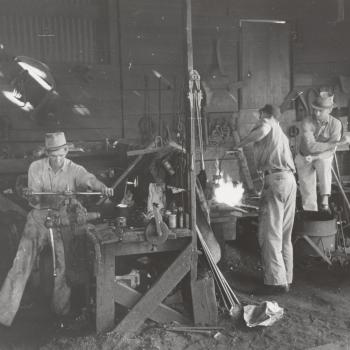The Working Catholic: Sacramental Neighborhoods by Bill Droel
Robert Moses (1888-1981) was the public works czar for Metro New York. His projects included highways, bridges, parks and more. He also spearheaded a few Upstate projects. The Power Broker: Robert Moses and the Fall of New York by Robert Caro (Random House, 1974) is the definitive biography. A gripping chapter is titled “One Mile.”
There is a slight bend in a short section of what is now the Cross Bronx Expressway (IS 95). In December 1952 residents in East Tremont neighborhood got a letter from Moses. It gave a vacate order of 90 days to over 5,000 people living in 1,530 units. Those residents organized and through months and then years they proposed a straightaway route for the highway that would require minimum displacement. They provided expert testimony, attended countless meetings, raised money, met with many officials and persistently lobbied for their plan, but to no avail.
Neighborhoods are sacraments (lower case s). A sacrament contains what it signifies. It conceals what it reveals.
Modernity is premised on growth, efficiency and individual initiative. Meritocracy is its companion. That is, the assumption that successful people deserve what they attain; struggling people are flawed. Catholicism, by contrast, says that God is Truth (capital T) and that all the small truths (lower case t) are avenues to and from God. Catholicism thus embraces responsible science, reason, experimentation, striving and accomplishment. However, the Catholic sacramental imagination differs from the modern premise in that Catholicism believes in a cooperative, organic society in which each person has a stake and in which each person can contribute something. Many modern elites (conservatives and liberals) overlook or are even hostile to the organic/sacramental nature of neighborhoods. These sophisticates might include urban planners, speculators, elected officials, financiers, block-busting realtors, some engineers, some developers and more.
The unnecessary curve in the Cross Bronx Expressway destroyed more than buildings. Family life was disrupted. An effective process of assimilation was eliminated. As Caro writes, people who loved our country “would be an alienated, hostile, a hating force within it,” at least for a time. And maybe to the whole point of the Bronx episode, the curve also meant that arbitrary authority overpowers reasonableness, community sensitivity and the sacred.
This tale does not imply that no highways should be built or in other examples that gentrification is an unqualified evil. It does mean that like with a matchstick house the meaningless removal of one small part depletes a neighborhood and a city. And as we now realize, careless efficiency and on a bigger scale so-called progress gravely damages an entire layer of our environment—likely to the death of our planet.
For about 200 years Catholicism in our country made major investments of money, material, staff and leadership in urban neighborhoods. Not every parish shiningly served as a sacrament which revealed God amidst streets and alleys, stores and homes, parks and social centers. (A subsequent column will consider the complexities of race relations.) But the investment certainly helped make Philadelphia, Buffalo, Boston, Chicago, Detroit and other cities closer to the image of God.
A neighborhood’s greatness arises from relationships; from its hospitality to new arrivals, to students and workers, to the elderly and dispossessed, to young parents and to the poor. From an unlikely mixture of urban characters come poets, bus drivers, teachers, restaurateurs and citizens. Neighborhoods are incubators of culture. The neighborhood is a place where women and men come to make their way in the world. As relationships are nurtured and respected, the neighborhood gives life to the next generation.
Droel edits INITIATIVES (PO Box 291102, Chicago, IL 60629), a newsletter on faith and work.










